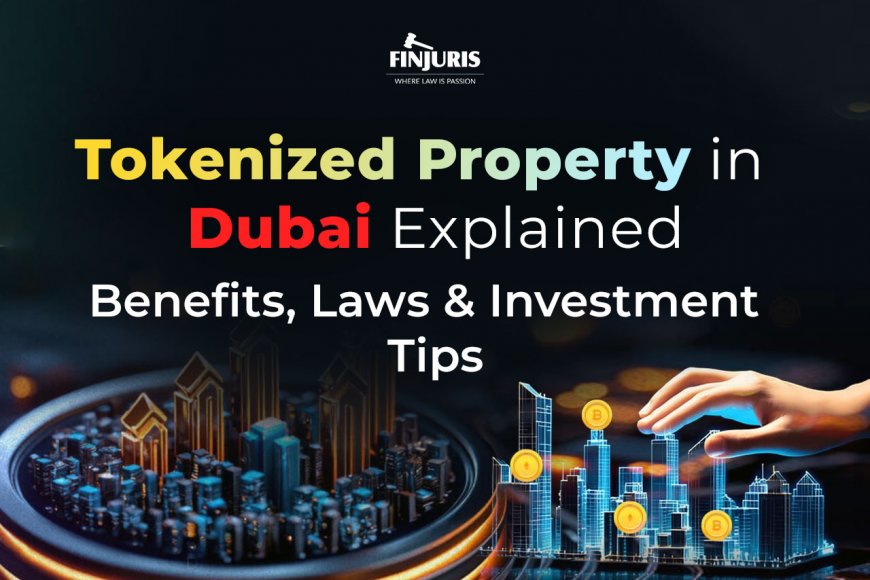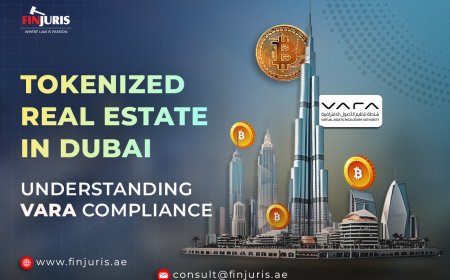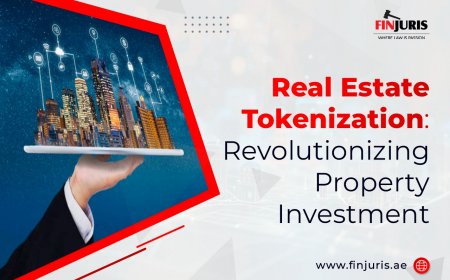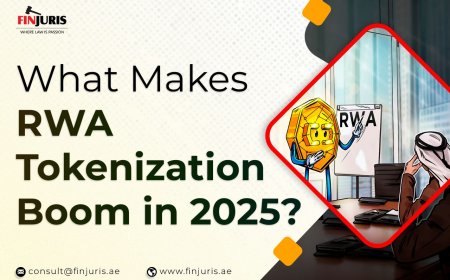Tokenized Property in Dubai Explained: Benefits, Laws & Investment Tips
Explore tokenized property in Dubai—its benefits, legal framework, and tips to invest smartly in blockchain-powered real estate.

Tokenized property involves the digital representation of real estate assets on a blockchain. Tokenizing property involves the fractionalizing of ownership into digital tokens, with each token representing a fraction of the property. Property tokens can be bought, sold or traded providing never before seen access and liquidity for real estate investments.
Tokenizing property allows individuals to access and be part of real estate ownership anywhere in the world with very low amounts of capital by bridging traditional and digital financial ecosystems together. This also changes the way property can be perceived and transacted, replacing clunky paperwork and centralization with automation and decentralization.
Tokenization also enables real estate to connect and be part of the wider digital asset economy. It allows property tokens to be integrated with DeFi protocols to allow investors to stake their property tokens and earn yield or use them as collaterals in other financial products.
The Role of Dubai in PropTech Innovation
Dubai has established itself as a global leader in PropTech (property technology) innovation, providing a testing ground and implementation platform for real estate tokenization with willing regulatory authorities, an advanced and tech-savvy investor base, and a continuous strategy to embed blockchain throughout the real estate journey.
The emirate's commitment to upgrading its technology is demonstrated through initiatives such as Smart Dubai and the Dubai 10X program. These initiatives encourage both private sector and public institutions to think about improving their standard practices using advanced digital solutions, which means that Dubai is a perfect environment for tokenization to thrive.
The city has also launched the Dubai Metaverse Strategy to facilitate more than 40,000 virtual jobs before 2030, which again coincides with tokenized real estate where property assets could be usable or viewable in the virtual world, creating further opportunities for property ownership.
What is Tokenized Property?
Tokenized property takes equity ownership of real estate assets and converts it into tokens on the blockchain. It can allocate ownership rights to many different investors via the blockchain, which enhances accessibility and reduces transaction costs and barriers.
Tokens work as digital certificates that can represent an equity stake, debt, or profit-sharing right in the underlying asset. Unlike typical real estate, which can require a large sum of money upfront and a long period of time to own, tokenized real estate allows for fractional ownership, which can diversify risk and opens property ownership to a larger base of investors.
Tokenized property can include residential, commercial, or industrial properties, and mixed-use property development, as well as usually be relatively more transparent than other alternatives. The blockchain essentially acts as a ledger to document and track transactions, therefore, all parties are accountable for transactions in a transparent ledger, which is essential for establishing trust with non-relatives and partial owners.
Because of the programmable nature of contracts, smart contracts can automatically execute distributions of income (like rental yields), and can execute without manual intervention, thereby improving investor experience and operational efficiency.
Reasons why Dubai is a Hotspot for Real Estate Tokenization
Dubai's real estate market has long drawn international eyes and with the advent of tokenization, it appears as if Dubai will begin a completely new era of global exposure and innovation.
- Regulatory Framework: Dubai has put in place government sanctioned regulatory frameworks for digital assets, and this encompasses tokenized securities. Regulatory clarity will help give investors’ confidence to engage in digital transactions.
- Blockchain Strategy: Dubai has rolled out initiatives such as the Dubai Blockchain Strategy with the aim to ultimately create a blockchain hub that will integrate this technology across all sectors by 2030.
- Property Market: Dubai’s dynamic property market, characterized by luxury developments, freehold zones, and high returns, is attractive to global investors seeking diversification.
- Innovation Ecosystem: With government backed projects such as Dubai Future Foundation, and additional private sector ecosystem driven initiatives, the city is headed towards a PropTech landscape, one that is known to foster explosive growth in startups and creates global interest from fintech companies.
- Additionally, Dubai's position: As a global business and travel hub ensures a steady influx of residents and investors, which supports demand and stability in the property sector.
- Dubai's tax-free regime and investor: Visa options further incentivize foreign capital flow, particularly from Europe, Asia, and North America, where traditional real estate markets are more regulated and expensive.
Advantages of Tokenized Property in Dubai
- Fractional Ownership: Investors can buy a share of a high-value property thereby providing access to real estate for more investors. Small investors can also buy into property and diversify their portfolio without the need for substantial capital.
- Liquidity: The tokenized assets can be traded in a secondary market, which offers greater liquidity compared to traditional real estate spending months waiting to cash out.
- Transparency: Blockchain provides an immutable ledger which records all transactions. The blockchain allows anyone to verify the authenticity of every transaction. This makes it more difficult for fraud to occur and builds constructive engagements between parties.
- Lower Transaction Costs: The automated process of smart contracts reduces the need for intermediaries as a broker, lawyer, and notary - which can save investors significant amounts of money in transaction costs.
- Global Reach: Digital platforms allow anyone in the world to invest in Dubai's property market. It also makes cross-border real estate transactions easier.
- Faster Transactions: The time before a deal can be finalized is substantially decreased through adoption of Blockchain technology. Tokenized transactions can finalize in minutes, not weeks.
- Diversification: An investor can own fractions of multiple properties across a range of locations and types of assets, reducing risk and optimizing returns.
- Real-time Portfolio Monitoring: Investors will be able to monitor their stage of assets in real-time through dashboards, which can track metrics, for example, rental yield, appreciation, and liquidity.
- Automated Income: Rental returns and capital growth can be distributed automatically via smart contracts, thus rendering the investor experience easier.
- Environmental Considerations: The digitization of the process means less paperwork, less physical transport, and less administration, which all contribute positively towards sustainability targets.
Read More: Real Estate Tokenization: Revolutionizing Property Investment
Legal and Regulatory Context
Dubai has recently introduced regulation under a few different authorities - such as the Dubai Land Department (DLD) and the Virtual Assets Regulatory Authority (VARA) - to offer a clear direction for real estate tokenization. The idea is to allow for innovation while providing investor protections and stability in the market.
Key considerations:
- Legal Status: Tokenized assets must be recorded with the DLD which legally recognizes the ownership of the token as enforceable under local laws.
- Smart Contracts Status: Smart contracts must be legally enforceable under UAE law. Regulatory entities will ensure that the smart contracts are based on a verifiable framework.
- AML/KYC Regulations: investors will need to go through robust anti-money laundering (AML) and know-your-customer (KYC) processes to ensure they are not participating in illegal activities, and they are accountable.
- Licensing: As part of regulations, tokenization must acquire the appropriate license from VARA and DLD to operate within jurisdiction.
- Custodianship and Escrow Services: Some platforms are required to work with licensed custodians to manage property deeds and token security.
- Investor Protections: Regulated platforms must provide disclosures, audited financials, and risk assessments to promote transparency and protect stakeholders.
How Tokenization Functions (Step-by-Step)
- Property Selection: Evaluate and select a real estate asset based on market demand, rental yield, and appreciation potential.
- Legal Structuring: Form an entity or SPV (special purpose vehicle) to hold the property. This entity will issue digital tokens.
- Token Creation: Create digital tokens that represent fractional ownership or other rights to income derived from the property.
- Smart Contract Integration: Program and deploy smart contracts on a blockchain network to automate the distribution of dividends, voting, and transferability.
- Platform Listing: List on a regulated marketplace that allows secondary trading and investor participation.
- Investor Onboarding: Investors register, intend to complete KYC/AML checks, and deposit funds.
- Token Purchase and Ownership: Investors purchase tokens and now have fractional ownership of the property and are entitled to rental income, appreciation value of the asset, or dividends.
- Secondary Trading: Tokens can be sold in approved secondary markets allowing for liquidity and price discovery.
- Ongoing Management: The property is managed by a professional management company, maintaining the property operationally, reporting performance periodically.
Risks and Considerations
- Regulatory Uncertainty: While Dubai has progressive legislation, the vast and varied regulatory approaches globally that apply to crypto, and tokens may affect investor confidence in the jurisdiction.
- Technology Risks: Technological risk encompasses bugs, cybercrime, or smart contract malfunctions, all of which will expose you to the risk of loss in the Blockchain world with 0 recourse.
- Liquidity Risk: Tokenized real estate is more liquid than traditional property, but the secondary market is still maturing.
- Market Valuation Risk: The price of the token could go up or down based on a reduction in the market value of the underlying property, general market sentiment or shifts in the economy broadly.
- Fraud Risk: It is important that investors perform their due diligence. It is important to vet the platform, the developer and the legal documentation and to ensure you are working with a legitimate entity.
- Tax and Legal Uncertainty: While Dubai has an advantageous tax regime today, that may change and legislation to it could trigger a whole new consideration for returns, inheritance, or repatriation of funds.
- Platform Risk: Investors are dependent on the integrity, security and continued support of the tokenization platform for liquidity and asset management.
How to Invest in Tokenized Real Estate in Dubai
- Pick a Reputable Platform: Carry out your due diligence on platforms with a solid history, regulatory licenses, and favourable reviews.
- Register and comply with KYC: Submit the requested identity document, proof of address, and proof of the source of income. This is a must.
- Browse your investment opportunities: Choose properties according to location, increase in value with similar properties, rental yield, token price, and associated risk profile.
- Buy tokens: Acquire tokens using fiat currencies (such as the AED) or pre-approved cryptocurrencies (such as BTC and ETH). Some platforms will accept multiple currencies as token purchases.
- Monitor your performance, and trade: Use the in-built analytics and reporting features to measure your property performance, and trade token if you feel desired. Look at your dividend yield, property gain, and market changes that can affect returns.
- Withdraw your returns: Withdraw your rental yield and/or property appreciation in your linked bank account or crypto wallet.
- Diversify your portfolio: Use any profit to invest in multiple properties, or regions, which may minimize your risk.
- Stay up to date: With platform, regulation, and your property's performance reports.
Read More: Tokenization of Real Estate Assets – The Future of Property Investment
Top Tokenized Real Estate Platforms in UAE
- SmartCrowd: Dubai-based platform licensed by the DFSA. Offers access to pre-vetted residential and commercial properties with low entry points.
- RealT: Global player entering the UAE market. RealT tokenizes U.S. and international properties and facilitates cross-border investments.
- Aqarchain: Home-grown platform that tokenizes property and offers DeFi services like staking and yield farming.
- Evai: Specializes in AI-based ratings and token evaluations. Expanding into real estate-focused services.
- Blocksquare: A blockchain infrastructure provider enabling businesses to tokenize real estate assets in compliance with local laws.
- Tangany: Provides crypto custody and token issuance services, partnering with tokenized real estate ventures worldwide.
- RealBox: Focused on Southeast Asia and MENA regions, RealBox allows investment in digital real estate assets across borders.
The Future of Tokenized Real Estate in Dubai
With increased regulatory and technological buy-in, Dubai's real estate tokenisation is set for tremendous growth. The city's ambition to be the global blockchain capital, ushers in a future where more property transactions will be completed on token-based platforms.
As ecosystems develop and grow, we can expect to see:
- The opening of mega Real Estate token funds by institutional actors.
- A possible integration of the Dubai Land Department (DLD) and blockchain registration to facilitate registrations.
- More public-private partnerships to help systematize ecosystem development.
- Expanding use of AI and data analytics tools to enhance property assignment, valuations and risk analysis.
- The introduction of tokenized real estate investment trusts (REITs), that will offer additional liquidity.
The emergence of properties that are compatible in Metaverse to usher in alternative revenue sources generated in virtual reality.
Most importantly, various education campaigns and investor awareness programs will assist with demystifying tokenized real estate, which will help direct more capital into an already attractive market.
Dubai’s combination of advanced technologies, regulatory support, and growing real estate market creates the perfect environment for exploring tokenized property investments. Tokenized real estate democratizes real estate investment by allowing fractional ownership, reducing costs for investors and increasing access and liquidity for property investors. However, with any investment comes risks and it is important to understand them and use reputable platforms.
If you are a local investor or an international buyer looking to get exposure to the booming property market in Dubai, tokenized real estate is a great entry point. Now, it is time to embrace the future of real estate ownership - Decentralized, digital, and democratic.
FAQs
Is tokenized real estate legal in Dubai?
Yes, tokenized real estate is legal and regulated by authorities such as the Dubai Land Department and VARA.
How do I start investing in property tokens?
Register on a licensed platform, complete KYC, browse listed properties, and purchase tokens.
What are the risks involved?
Risks include technology vulnerabilities, regulatory changes, limited liquidity, and market volatility.
What’s the minimum investment required?
Depending on the platform, minimum investments can start as low as AED 500–1,000.
Are returns on tokenized property taxable in UAE?
Currently, the UAE does not impose taxes on personal income, including real estate returns. However, this is subject to change and should be monitored.
Can I use my property tokens as collateral for loans?
Some platforms and DeFi protocols offer the ability to stake or collateralize property tokens, though availability depends on regulatory and platform-specific rules.
What's Your Reaction?




















